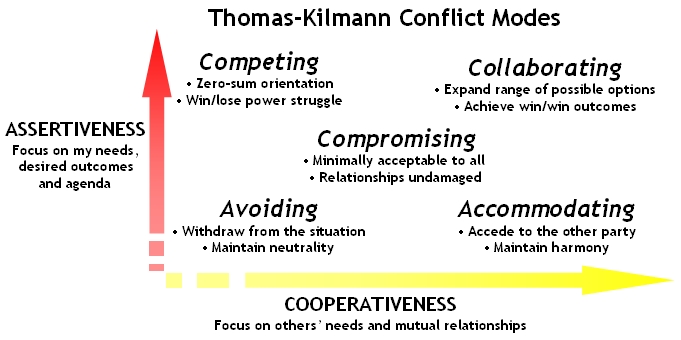Conflict Resolution
Recently I took a quiz on determining conflict resolution styles based on the Thomas-Kilmann Conflict Mode Instrument. The quiz consisted of questions involving whether you rarely, sometimes, often, or always react to situations in a manner that revolve around the types of conflict resolution styles: collaborative, competing, avoiding, accommodating, and compromising. I realized, though, when reading some of the questions that my response would depend on the type of conflict I was faced with. For example, the statement “to break deadlocks, I would meet people halfway” was difficult for me to settle on an answer. If the deadlock involved something trivial, such as if someone insisted that in the movie Mean Girls they wore green on Fridays and not pink on Wednesdays, it would be easy for me to let the argument go and allow the person to believe they were correct if they dismissed my correction. However, if the deadlock involved a debate over the autonomy of a woman and her right to choose, or another subject that was dehumanizing a group of underrepresented people, I wouldn’t be able to walk away from the conflict or willing to compromise my position: at least that is what I say.
“I am cognizant of the inter-relatedness of all communities and states. I cannot sit idly by in Atlanta and not be concerned about what happens in Birmingham. Injustice anywhere is a threat to justice everywhere. We are caught in an inescapable network of mutuality, tied in a single garment of destiny. Whatever affects one directly, affects all indirectly. Never again can we afford to live with the narrow, provincial "outside agitator" idea. Anyone who lives inside the United States can never be considered an outsider anywhere within its bounds.”
- Dr. Martin Luther King Jr., “Letter from a Birmingham Jail”
When examining divisive moments in history, almost everyone wants to believe they would have been on the right side of history. It is easy to say that you would have supported the underground railroad, or you would have helped Jewish people escape during the Holocaust; but as history has shown that most people, when actually faced with the choice to either put themselves at risk to help others or staying safe and ignoring the plight of the downtrodden, prioritize their own safety. The case can be made that we face a similar choice in contemporary America. The Black Lives Matter movement, immigration conditions at the border, and internationally in Hong Kong. Today, many people post online with hashtags of support and never put their lives on the line or invest financially to support the cause. Inaction isn’t supporting those in the wrong in these scenarios, same as not being actively apart of the underground railroad, but is it allowing you to truly be considered on the right side of history?
I say that I am against bullying in any form; however, one of my biggest regrets comes from an incident in high school. I was walking to my locker down a crowded hallway my senior year and saw a sophomore who didn’t have many, if any, friends. I had seen him occasionally in school, I was older so didn’t have many interactions with him. He was very quiet, and it seemed like he always tried to make himself seem small in a room. On my way to my locker, I saw another senior, one of the “popular kids” come up behind him, shove him into a locker, and walk off. The sophomore stumbled but didn’t fall to the ground; he regained his footing and looked me in the eyes. I didn’t yell after the kid that pushed him; I didn’t say anything at all. I stood there and watched the sophomore recover his composure and continue walking. What I saw was wrong, but I didn’t say or do anything to go against it. I know I was in the wrong that day, because I did nothing. Now I try to look back on this situation when I am not sure whether I should go out of my way to help someone or to stand up for someone who is not there to defend themselves.
“Not everything that is faced can be changed, but nothing can be changed until it is faced.”
- James Baldwin, "As Much Truth As One Can Bear"
For those that don’t have the means to travel and physically be present in support of causes, mindsets can be changed one person at a time through dialogue. Understanding the other person’s viewpoint and educating yourself on facts in order to better support your argument and being willing to speak out are the first steps. Also, understanding your privileges and leveraging them as a platform to share your views or to amplify the message of someone without access to that platform will extend your message further. (I realize this is where some people may tune out, seeing privilege as a “dirty word;” I will attempt to address this conception of privilege in a later blog post.) Being collaborative allows for optimizes group cooperativeness and assertiveness and leads to the best results when facing a problem. However, not all conflicts have a middle ground, and the solution to a question may be binary. Furthermore, when the other position is homophobic, sexist, racist, etc. I will gladly adopt a competing conflict resolution style of increased assertiveness and decreased cooperativeness. Simply put, I cannot, and will not, compromise my morals for the sake of my comfort.
“You are growing into consciousness, and my wish for you is that you feel no need to constrict yourself to make other people comfortable.”
- Ta-Nehisi Coates, Between the World and Me
Types of Conflict Resolution Modes: https://www.edbatista.com/2007/01/conflict_modes_.html

